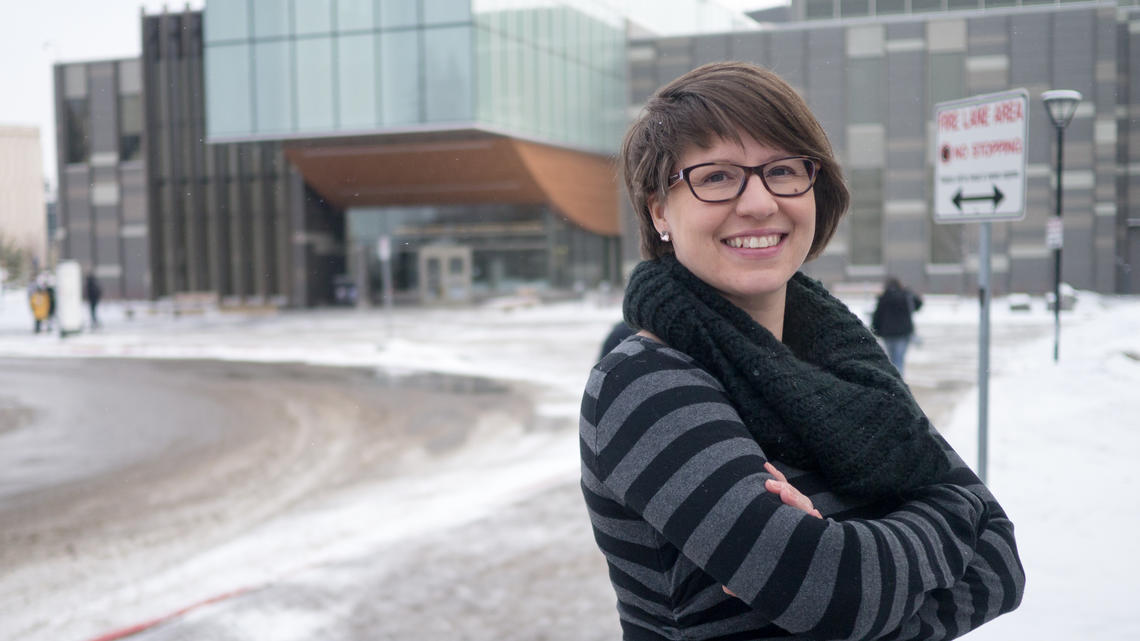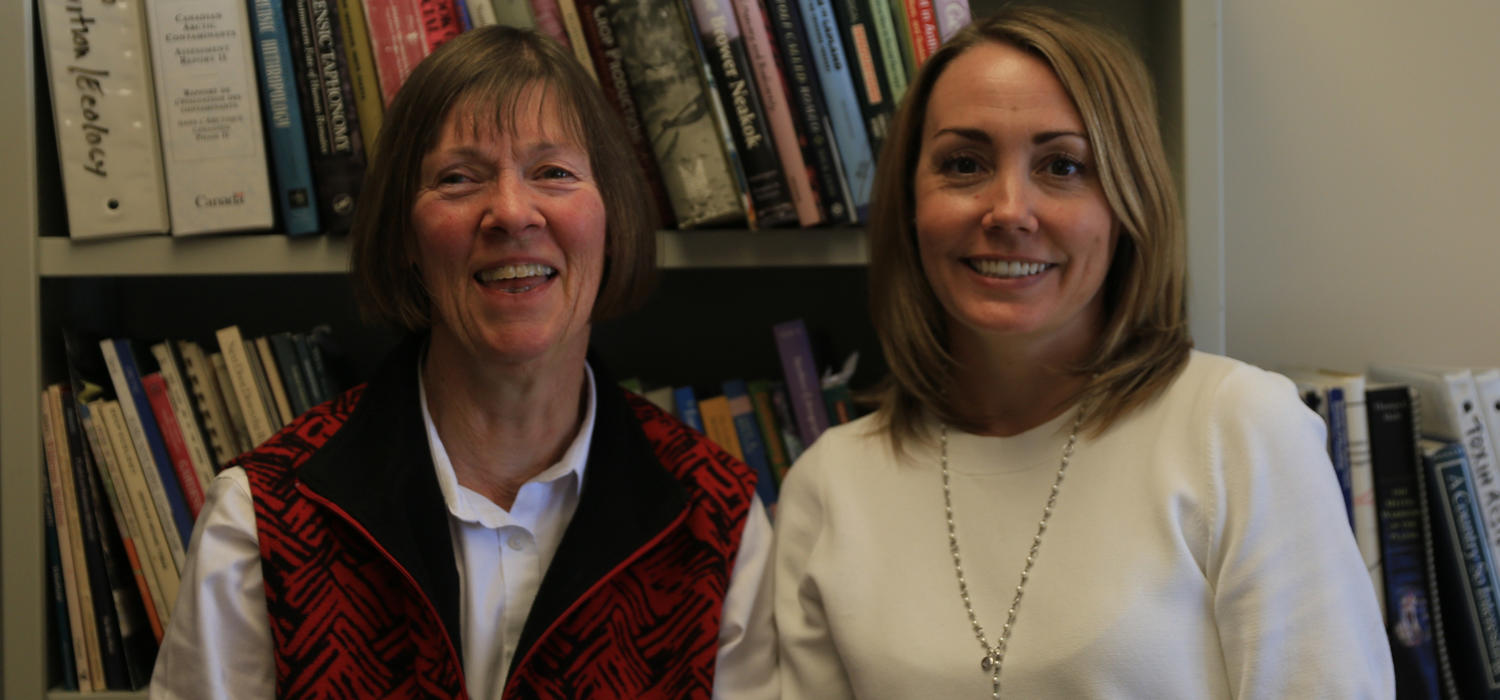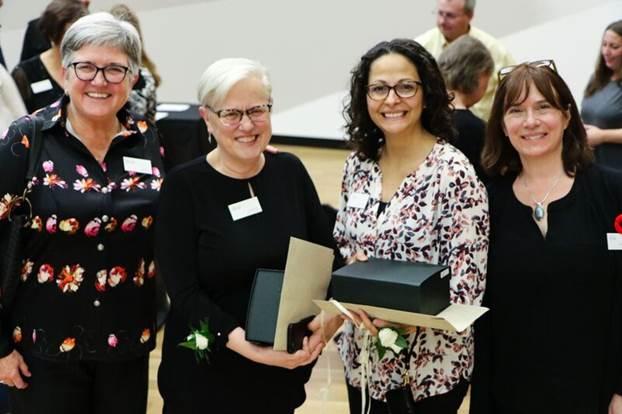
Erin Kaipainen notes the connection between experiential learning and career development.
Travis Dickie
Nov. 26, 2018

Canadian post-secondary institutions are undergoing a noticeable shift toward stronger emphasis on experiential learning. Erin Kaipainen, senior specialist in experiential learning at the Taylor Institute for Teaching and Learning, believes the change has only just begun.
“In addition to being associated with student engagement, experiential learning is associated with career development,” she explains. “As a result, institutions across Canada are investing in experiential learning, particularly in Ontario where higher education has a mandate to ensure that 100 per cent of their undergraduate students have the opportunity to participate in an experiential learning activity before they graduate.”
Working under the guidance of the vice-provost (teaching and learning), staff within the Taylor Institute are developing centralized supports to expand hands-on learning opportunities for students. Immediate priorities for this team include developing common language for experiential learning activities at the University of Calgary, providing pedagogical resources and offering tools such as a campus platform for connecting students with community and opportunities. The Taylor Institute team also seeks to connect educators who are doing this work, and it has organized two lunch-and-learn events this month.
“There’s a lot of expertise here on campus,” Kaipainen says. “We wanted a way to bring together academic and non-academic staff who are interested in experiential learning to highlight exceptional practices and share tips and approaches for facilitating learning through experience.”
Transferring knowledge to real-world situations
The first lunch-and-learn was facilitated on Nov. 21 by Dr. Dianne Draper, PhD, a professor in the Department of Geography, and Dr. Sarah Skett, PhD, a research associate in Sustainability Studies. Their presentation focused on two of the core courses in the University of Calgary’s Certificate in Sustainability Studies. Currently, these courses engage students in applied research projects with the City of Calgary’s Office of Sustainability to address Calgary’s food systems’ current and future needs.
“Experiential learning, for me, provides students the opportunity to understand and apply both their knowledge and learning in a practical and real-world way,” Skett says. “Students are able to see the transfer of their knowledge from the classroom to real-world applications. They begin to understand different ways of knowing and learning, and it allows them to reflect on the issue or challenge with a more in-depth approach — rather than being told how to address the problem, they must learn it themselves — and it's messy and sometimes overwhelming, but in the end they develop a greater confidence in their knowledge and capacities.
"I truly believe that experiential learning allows students to build their leadership skills, be it in their academic pursuits, workplace or communities.”

Erin Kaipainen notes the connection between experiential learning and career development.
Travis Dickie
Experiential learning as civic engagement
On Nov. 30, the Department of English’s Dr. Stefania Forlini, PhD, associate professor, and Dr. Susan Bennett, PhD, professor, will discuss Community Engagement through Literature, a course incorporating experiential learning that they’ve now co-instructed eight times. On Nov. 9, the two instructors received a Teamwork Award at the Calgary Public Library’s 44th Annual Celebration of Library Volunteers for their work on this course.
Designed as a collaboration with the Calgary Public Library, the eight iterations of English 520 have involved approximately 42 undergraduate students, who have worked with 140 high school volunteers and 450 elementary and junior high school students across six different local library branches.
Bennett believes that “experiential learning demands active students who take responsibility for the knowledge and skills they’ve acquired and who are willing to share these attributes for the benefit of others.” She sees this philosophy exemplified in her own course, arguing that “assignments in the course offer students the opportunity not only to reflect carefully on how they’ve taken what they know into the volunteer experience, but also to provide tangible feedback to the Calgary Public Library — evidence that is of genuine use in the design and delivery of their programs in branches across the city.”
Forlini believes this process highlights the importance of students’ roles in contributing to their communities. “It comes to realizing that we are in a very privileged position to be within the university system, and that we have a certain obligation to give back to some of the communities that support us and that we’re part of,” she says. “I think that’s part of what our original motivation for the course was, to forge that connection with these broader communities, but also to give back.”
She believes this is a particularly pertinent idea for those in the English discipline. “I think that, especially in English where we talk about the great diversity of human experience, of human history, where we imagine past, present and futures, through the literature that we engage with, students are actively engaged in these big questions about our connections to each other and how we understand each other, how we empathize with each other,” she says.
“It’s quite a natural bridge, really, to bring it out, to connect with actual communities in and around the university. I think that could only strengthen the type of literacies we teach for civic engagement more generally. “
Register to attend the second Experiential Learning Lunch and Learn
The second Experiential Learning Lunch and Learn, Community Engaged Learning for Undergraduates, will be held Nov. 30 in TI 250 from 12 to 1 p.m.

The Department of English’s Stefania Forlini and Susan Bennett received a Teamwork Award.
Frank Wood